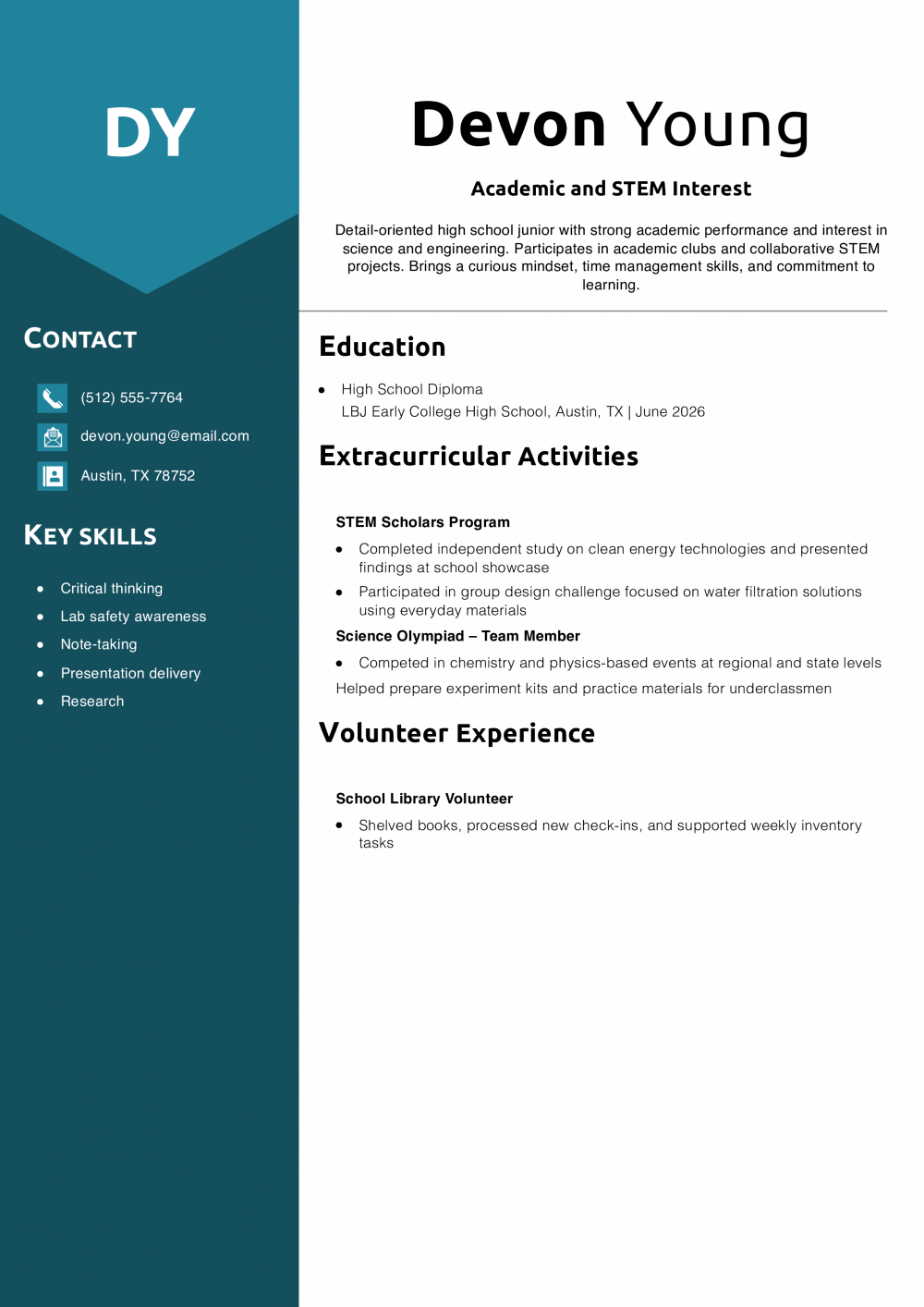Crafting a strong resume is an essential step in job hunting, especially for individuals with little to no formal work experience. Whether you’re a student, a recent graduate, or changing careers, a well-structured resume can create new opportunities. Employers often look for potential and skills rather than just job experience, making it important to present yourself compellingly.
This guide will help you understand the critical components of how to write a resume with no experience, provide no-experience resume examples, and offer tips for beginners on customizing and submitting your resume.
Key Components of a No-Experience Resume
The first impression you make on potential employers, your resume header should include your full name, phone number, email address, LinkedIn profile, and a link to your portfolio if you have one. Ensuring that your contact information is up-to-date and professional is crucial.
For instance, your email address should ideally include your name rather than a nickname or an unprofessional moniker. Additionally, avoid unnecessary personal details like a photo, marital status, or age, as these can lead to unconscious bias and are generally not considered relevant information in the hiring process.
Resume objective or summary
This is a brief statement that conveys your career goals and what you offer. It should be tailored to the job you’re applying for and can make your resume stand out. A well-crafted objective can show your enthusiasm for the role and your understanding of the company’s needs
Examples
- Student: “Motivated high school graduate seeking an entry-level position in customer service to apply excellent communication and solution-finding skills and improve customer satisfaction.”
- Recent graduate: “Recent college graduate with a bachelor’s degree in Marketing seeking to apply academic knowledge and internship experience to a full-time role in digital marketing, aiming to drive online engagement and conversions.”
- Career changer: “Detail-oriented project manager transitioning to a career in software development, leveraging a background in project management to lead teams and deliver software solutions efficiently.”
Education
Your educational background is a significant part of your resume, especially when you lack work experience. List your school, degree, and graduation date. If you’ve attended any courses or seminars relevant to the job, include them to showcase your commitment to learning and your preparedness for the job. Adding relevant coursework, projects, and academic achievements can help demonstrate your knowledge and skills.
Examples
- High School Student:
- XYZ High School, GPA: 3.8. Relevant coursework: AP English, AP Calculus
- Achievements: Debate club president, honor roll
- Actively participated in the science club, leading to a district-level award in the annual science fair
- College Student:
- ABC University, Bachelor of Science in Computer Science, GPA: 3.5
- Relevant Projects: Developed a web application as a capstone project
- Achievements: Dean’s list, member of the computer science club, coordinated guest speaker events
Skills
Differentiating between hard and soft skills is crucial in making your resume stand out. Hard skills are technical abilities acquired through education and practice, while soft skills are interpersonal traits that define how you interact with others. It’s essential to identify and list skills relevant to the job you’re applying for. To effectively demonstrate your abilities, you can include specific software or tools you’re proficient in, as well as any foreign languages you speak.
Examples of top skills
- Finance: Analytical skills, financial modeling, proficiency in Microsoft Excel, risk assessment.
- Health care: Patient care, CPR certification, empathy, attention to detail, medical software proficiency.
- Tech industry: Programming languages (Python, Java), database management, resolving issues, agile methodologies.
Here are additional examples of top skills for different industries.
Highlighting Additional Experiences
Volunteer work
Unpaid work can demonstrate your transferable skills and commitment to community service. When listing your volunteer experiences, include the organization, your role, and the duration of your involvement. Describe your responsibilities and achievements to show your contributions and the skills you’ve developed.
Example
Volunteer, Animal Shelter, June 2022 – present
Assisted with daily care and socialization of animals, leading to increased adoption rates. Organized fundraising events that raised over $5,000 for shelter renovations.
Internships and part-time jobs
These provide valuable experience and can be leveraged in your resume. Even if the positions were not directly related to your desired career, the skills and responsibilities involved can often be transferred. Describing your duties and achievements clearly can display your capabilities and work ethic.
Example
Marketing Intern, XYZ Company, Jan 2023 – May 2023
Created social media content, increasing engagement by 20%. Collaborated with the marketing team to develop promotional materials and participated in strategy meetings to enhance brand visibility.
Extracurricular activities
These activities can showcase your skills and leadership abilities. When listing them, it’s important to detail your role and the impact of your participation. Leadership roles, in particular, can provide evidence of your ability to work with others and take initiative.
Example
Captain, University Soccer Team, Sept. 2023 – Dec. 2023
Led the team to a regional championship and coordinated training schedules. Mentored younger team members, fostering a supportive and competitive team environment.
Certifications and online courses
These show your commitment to continuous learning and skill development. List relevant certifications and courses, along with the issuing organization and completion date. These qualifications can set you apart by demonstrating specialized knowledge or skills that are in demand in your desired industry.
Example
Google Data Analytics Certificate, Coursera, June 2023
Completed coursework in data analysis, visualization, and project management.
Formatting Your Resume
Resume layout and design
A clean, professional design is essential for readability and organization. Use a simple font, consistent formatting, and plenty of white space to ensure your resume is easy to read. Avoid using too many colors or graphical elements, as these can distract from the content of your resume. Stick to a traditional resume template, but don’t be afraid to add subtle design elements to give your resume a modern feel.
Using bullet points and action verbs
To make your resume more impactful, you can use bullet points and action verbs. Use bullet points to break down your responsibilities and achievements into concise statements. Begin each bullet point with a strong action verb to convey your skills and experience effectively. This not only makes your resume more readable but also helps to highlight your most relevant experiences and skills.
List of action verbs: Achieved, led, managed, developed, improved, coordinated, implemented, facilitated, spearheaded.
Additional action verbs for your resume.
Saving and submitting your resume
Save your resume as a PDF to ensure it retains its formatting when viewed on different devices. This prevents any potential issues with layout or design that might occur when opening the document in various programs. When submitting your resume, follow the application instructions carefully. If applying via email, include a concise subject line and a brief message that references the position you’re applying for and your interest in the role. When applying online, it can be best to use a text-only (.TXT) version of your resume so your content can be easily scanned.
Customizing Your Resume
-
Tailoring to job descriptions
- Customizing your resume for each job application is ideal. Employers often use applicant tracking systems (ATS) to screen resumes, so including keywords from the job description can increase your chances of getting noticed. Analyze the job posting carefully and incorporate the keywords and phrases that match your skills and experience.
-
Industry-specific examples
- Different industries have unique requirements and preferences. Tailor your resume to demonstrate industry-relevant skills and experiences. For example, in the tech industry, you might focus on your coding skills and software proficiency, while in the health care field, you might emphasize patient care experience and relevant certifications.
See our resume examples for tech, health care, finance, education, and creative fields.
Additional Tips and Resources
-
Proofreading and feedback
- Thorough proofreading is essential to avoid errors that could cost you an interview. Take the time to review your resume for spelling, grammar, and formatting mistakes. Consider asking a trusted friend, mentor, or career counselor to review your resume and provide feedback. Fresh eyes can often catch mistakes you might have missed and offer valuable suggestions for improvement.
-
Using resume builders and templates
- Online resume builders and resume templates can help you create a professional resume quickly and easily. These tools often include tips and examples for crafting each section of your resume, making it easier to ensure that your document is well-organized and comprehensive.
-
Sample resumes and templates
- Explore sample resumes and templates to get inspiration and ideas for your resume. Resumetemplates.com offers free downloads of professional templates that you can customize to fit your needs. Reviewing examples can help you understand how to structure your resume and what content to include.
-
Resources for further assistance:
Frequently Asked Questions About Writing a Resume With No Experience
For someone with no experience, a functional resume is best, highlighting skills, education, and relevant projects or volunteer work. Tailor the content to the job description, focusing on transferable skills, and ensure it is concise and error-free.
Begin with your contact information, including your name, phone number, and email. Follow with a brief objective statement or summary that shows your skills, education, and what you hope to achieve in the position.
Work experience is not a must on a resume. Instead, focus on accentuating your skills, education, volunteer work, extracurricular activities, and relevant projects to demonstrate your capabilities and potential.
Creating a standout resume with no experience is possible with the right approach. By following the tips and examples provided in this guide, you can craft a resume that showcases your strengths and lands you an interview. Remember to tailor your resume for each application, proofread carefully, and seek feedback to refine your document. Take advantage of the downloadable templates and interactive tools on your journey to a successful career. With determination and the right tools, you can create a resume that will impress potential employers and help you achieve your career goals.
Resume Templates offers HR approved resume templates to help you create a professional resume in minutes. Choose from several template options and even pre-populate a resume from your profile.


